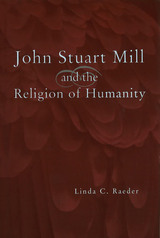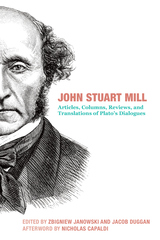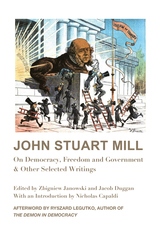3 books about John Stuart Mill

John Stuart Mill and the Religion of Humanity
Linda C. Raeder
University of Missouri Press, 2002
John Stuart Mill and the Religion of Humanity introduces material that requires significant reevaluation of John Stuart Mill’s contribution to the development of the liberal tradition. Through his influence, the radical anti-Christianity of the French tradition was incorporated into the Anglo-American political tradition. Mill’s nontheological utilitarianism also involved the equally important insinuation of Comtean “altruism,” with its notion of the superiority of social morality over personal morality, into Anglo-American consciousness. Linda C. Raeder’s study carefully examines the nature of modern secular liberalism, the chief political carrier of the Millian form of secular religiosity in the American context.
Raeder explores the influence of James Mill, Jeremy Bentham, Claude-Henri Saint-Simon, and Auguste Comte on John Stuart Mill’s religious thought and aims. She treats Mill’s Three Essays on Religion, discusses his participation in the Mansel controversy, and offers a new interpretation of On Liberty and Utilitarianism, both of which were crucial instruments in the accomplishment of his religious mission.
Raeder contends that Mill’s religious aim was two-pronged—the undermining of Christian belief and the establishment of the allegedly superior social morality and spirituality embodied in the “Religion of Humanity” that he adopted, with revisions, from Comte. Mill intended his philosophical writings to assist in the realization of this aim, and they cannot adequately be comprehended without an awareness of their subterranean religious theme.
John Stuart Mill and the Religion of Humanity examines the religious thought and aspirations of the philosopher and shows that, contrary to the conventional view of Mill as the prototypical secular liberal, religious preoccupations dominated his thought and structured his endeavors throughout his life. For a proper appreciation of Mill’s thought and legacy, the depth of his animus toward traditional transcendent religion must be recognized, along with the seriousness of his intent to found a nontheological religion to serve as its replacement.
[more]

John Stuart Mill
Articles, Columns, Reviews and Translations of Plato's Dialogues
John Stuart Mill
St. Augustine's Press, 2021
This is the second volume, following the well-received edition of Mill’s writing essential to understanding the liberal tradition. His commentary on a full spectrum of issues gives further insight into the strengths and vulnerabilities of liberal democratic theory in practice. Rare and difficult to locate material is here brought to attention and made available.
The contribution of Mill’s most authoritative biographer, Nicholas Capaldi, is a singular and unmatched highlight. The tenor of St. Augustine’s Press volumed on Mill is distinct in its intention to place his work in the framework of political philosophy and the conversation of the viability of liberalism as a tradition of thought.
The contribution of Mill’s most authoritative biographer, Nicholas Capaldi, is a singular and unmatched highlight. The tenor of St. Augustine’s Press volumed on Mill is distinct in its intention to place his work in the framework of political philosophy and the conversation of the viability of liberalism as a tradition of thought.
[more]

John Stuart Mill
On Democracy, Freedom and Government & Other Selected Writings
John Stuart Mill
St. Augustine's Press, 2019
In addition to “On Liberty” and “On Representative Government,” this new selection of Mill’s writings includes, among others, a number of less known of his writings, such as: “Civilization,” “Perfectibility,” “The Negro Question,” “On Education,” “On Aristocracy,” “On Marriage,” “On Free Press,” “Socialism,” Mill’s review of Tocqueville’s “Democracy in America,” his letters to Tocqueville, and several other writings.
If one can use a somewhat exaggerated language, Mill’s writings are to liberal-democracy what Marx and Engels’ writings were to Communism. Both systems gave expression to 19th century man’s longing for equality and justice, both promised to liberate him from the shackles of oppression, authority and tradition. Instead of liberating man, Communism created the most brutal system in human history, and its spectacular fall in 1989 is one of history’s greatest events. Western world today shows that liberal-democracy is no longer a benign doctrine, which advocates free market, minimum state and individual liberties, but, like Communism, is an all-encompassing ideology which forces an individual to abdicate his freedom and soul in favor of a Communist-like collective.
As many critics of real Socialism could see the seeds of totalitarianism in the writings of Marx and Engels, so one can see the seeds of liberal totalitarianism in Mill’s writings. This new edition is intended to help readers to understand why democratic-liberalism came so close to its 19th century ideological rival.
If one can use a somewhat exaggerated language, Mill’s writings are to liberal-democracy what Marx and Engels’ writings were to Communism. Both systems gave expression to 19th century man’s longing for equality and justice, both promised to liberate him from the shackles of oppression, authority and tradition. Instead of liberating man, Communism created the most brutal system in human history, and its spectacular fall in 1989 is one of history’s greatest events. Western world today shows that liberal-democracy is no longer a benign doctrine, which advocates free market, minimum state and individual liberties, but, like Communism, is an all-encompassing ideology which forces an individual to abdicate his freedom and soul in favor of a Communist-like collective.
As many critics of real Socialism could see the seeds of totalitarianism in the writings of Marx and Engels, so one can see the seeds of liberal totalitarianism in Mill’s writings. This new edition is intended to help readers to understand why democratic-liberalism came so close to its 19th century ideological rival.
[more]
READERS
Browse our collection.
PUBLISHERS
See BiblioVault's publisher services.
STUDENT SERVICES
Files for college accessibility offices.
UChicago Accessibility Resources
home | accessibility | search | about | contact us
BiblioVault ® 2001 - 2024
The University of Chicago Press









